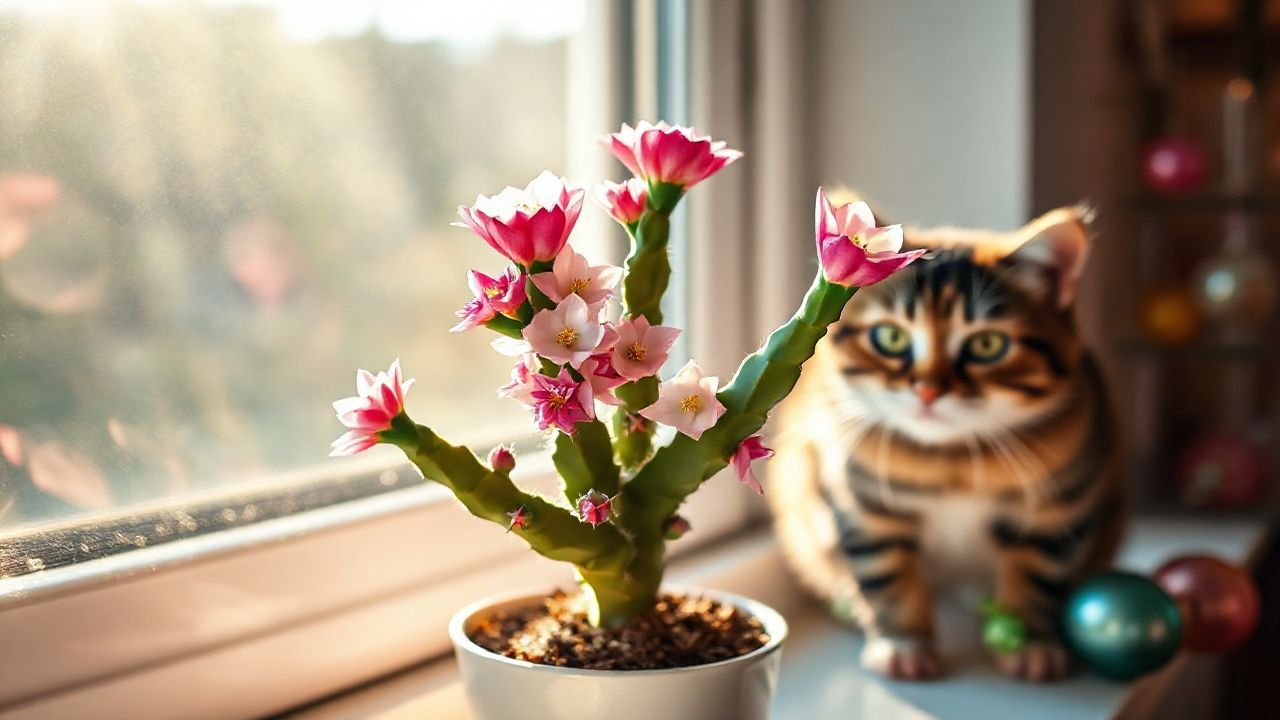Introduction to Christmas cactus and pet safety
Christmas cacti belong to the genus Schlumbergera, which also includes Thanksgiving cacti and Easter cacti. These plants are native to the tropical rainforests of Brazil. They are characterized by their flattened, segmented stems and brightly colored flowers. Christmas cacti typically bloom from late November to January, making them a popular choice for holiday decorating.
While Christmas cacti are not highly toxic to cats, they do contain a mild toxin called saponin. Saponins are found in many plants, including ivy, spinach, and tomatoes. When ingested, saponins can cause gastrointestinal upset in cats, such as vomiting, diarrhea, and abdominal pain. In severe cases, saponins can also cause respiratory problems and neurological symptoms. However, it is important to note that these severe reactions are rare. Most cats who ingest Christmas cactus will only experience mild, self-resolving symptoms.
Understanding plant toxicity
The toxicity of plants to cats is a common concern among pet owners, especially during the holiday season when festive plants adorn our homes. Among these popular holiday plants, the Christmas cactus (Schlumbergera bridgesii) raises questions about its potential toxicity to our feline companions. While Christmas cacti are generally considered non-toxic to cats, it’s important to delve deeper into their potential risks to ensure the safety of our furry friends.
Understanding plant toxicity requires considering various factors, including the plant’s specific chemical composition and the potential for ingestion. While some plants may be mildly toxic, causing minor digestive upset, others can pose serious health threats, even leading to life-threatening conditions. Therefore, it’s crucial to approach plant toxicity with caution and educate ourselves about the specific risks associated with different species.
In the case of Christmas cacti, the good news is that they lack significant levels of toxic compounds that could cause severe harm to cats. However, it’s important to note that even non-toxic plants can cause mild discomfort or digestive issues if ingested in large quantities. Therefore, it’s advisable to keep Christmas cacti out of reach of curious cats to prevent any potential ingestion and subsequent digestive upset.
Are Christmas cactus plants safe for cats?
Christmas cacti, scientific name Schlumbergera, are a popular holiday plant known for their vibrant, festive blooms. While these plants add a touch of cheer to the winter season, it’s important to consider their potential toxicity to our beloved feline companions. The question of whether Christmas cacti are safe for cats has sparked concern among pet owners, and the answer is not as straightforward as one might expect. In this blog post, we will delve into the details surrounding the toxicity of Christmas cacti and provide recommendations for keeping your cats safe during the holiday season.
Understanding the Toxicity of Christmas Cactus
The Christmas cactus belongs to the Cactaceae family, which includes many species that contain toxic substances. However, it’s important to note that the Christmas cactus is classified as only mildly toxic to cats. The plant contains a compound called triterpenoid saponin, which can cause gastrointestinal upset if ingested in large quantities. Symptoms of toxicity may include vomiting, diarrhea, and abdominal discomfort. In rare cases, excessive ingestion of the plant may lead to more severe neurological symptoms such as tremors or depression.
Tips for keeping cats away from houseplants
Christmas cacti, also known as Schlumbergera bridgesii, are a popular holiday plant known for their vibrant blooms during the winter season. While these plants are relatively harmless to humans, they can pose a potential risk to feline companions. The leaves of Christmas cacti contain a mild saponin toxin, which can cause gastrointestinal upset in cats if ingested. Symptoms of saponin poisoning can include vomiting, diarrhea, and abdominal pain. Although Christmas cacti are not considered highly toxic, they can still cause discomfort and should be kept out of reach of curious cats.
To ensure the safety of your feline friends, it’s crucial to take precautions to prevent them from interacting with Christmas cacti. Here are a few tips to keep cats away from these plants:
– Place plants in inaccessible areas: Cats are naturally curious and may be tempted to investigate new objects. By placing Christmas cacti in elevated locations, such as on high shelves or hanging baskets, you can make them less accessible to your pet.
– Use a deterrent spray: There are several pet-safe deterrent sprays available that can help keep cats away from plants. These sprays often contain natural ingredients like citrus or vinegar, which cats typically find unappealing. Simply spray the deterrent around the base of the Christmas cactus or on the leaves to create an invisible barrier.
– Provide alternative scratching surfaces: Cats have a natural instinct to scratch, and they may be drawn to Christmas cacti if they lack other suitable scratching surfaces. Offer your cat plenty of scratching posts, cardboard boxes, or sisal mats to redirect their scratching activity away from your plants.
– Redirect attention with toys: If your cat shows interest in the Christmas cactus, try to distract them with interactive toys or treats. Engage in playtime and provide them with plenty of stimulation to keep them occupied and less likely to seek out the plant.
Conclusion: Keep plants and pets safe
If you suspect your cat has ingested any part of a Christmas cactus, monitor them closely for any signs of distress. If any concerning symptoms arise, such as excessive vomiting, lethargy, or difficulty breathing, contact your veterinarian immediately. Prompt medical attention is crucial to ensure your pet’s well-being and prevent any complications from developing.
Remember, prevention is always the best course of action when it comes to pet safety. By keeping Christmas cacti and other potentially toxic plants out of reach, you can provide a safe and healthy environment for your furry companion to enjoy the holiday season.

Leave a Reply